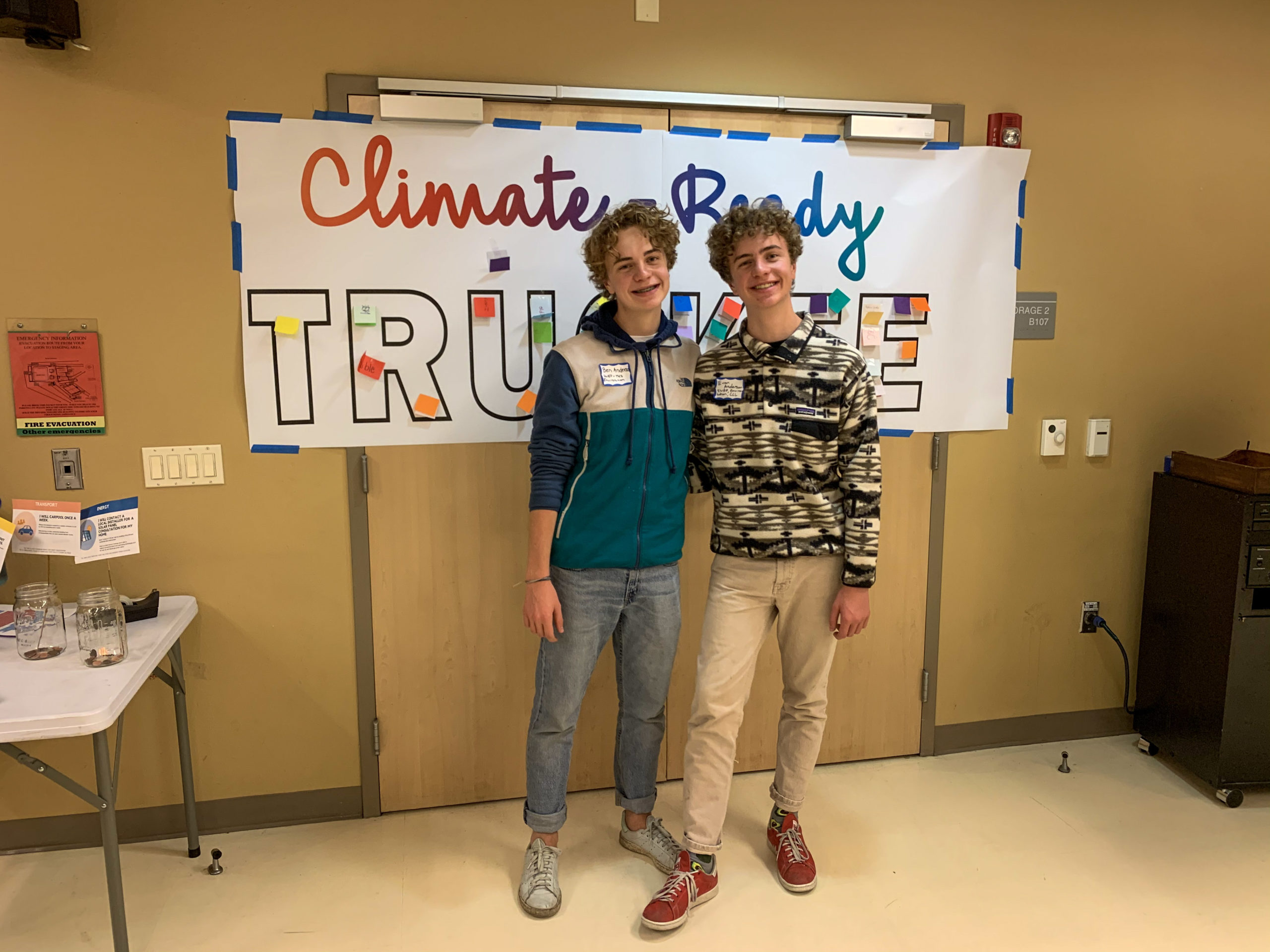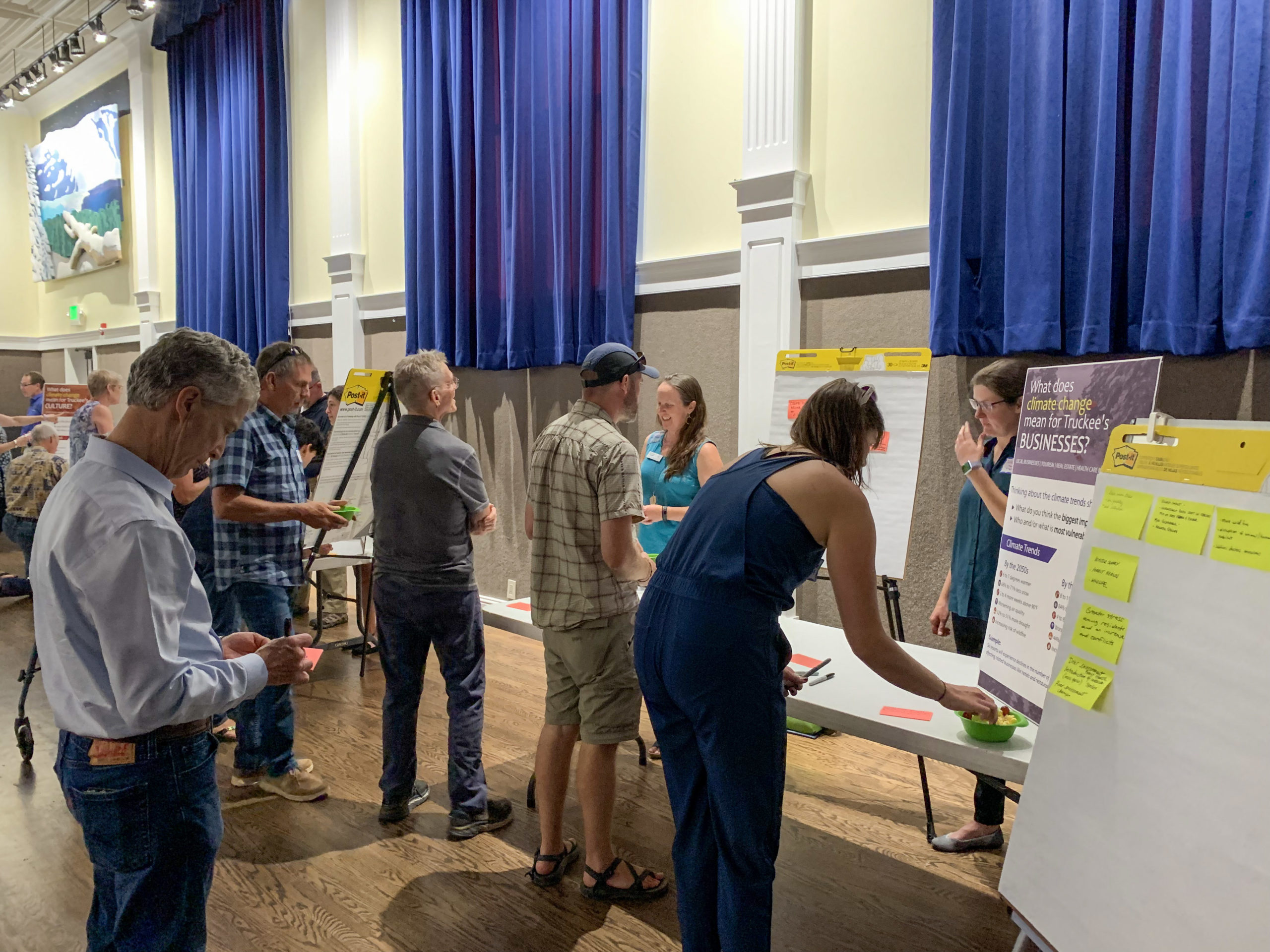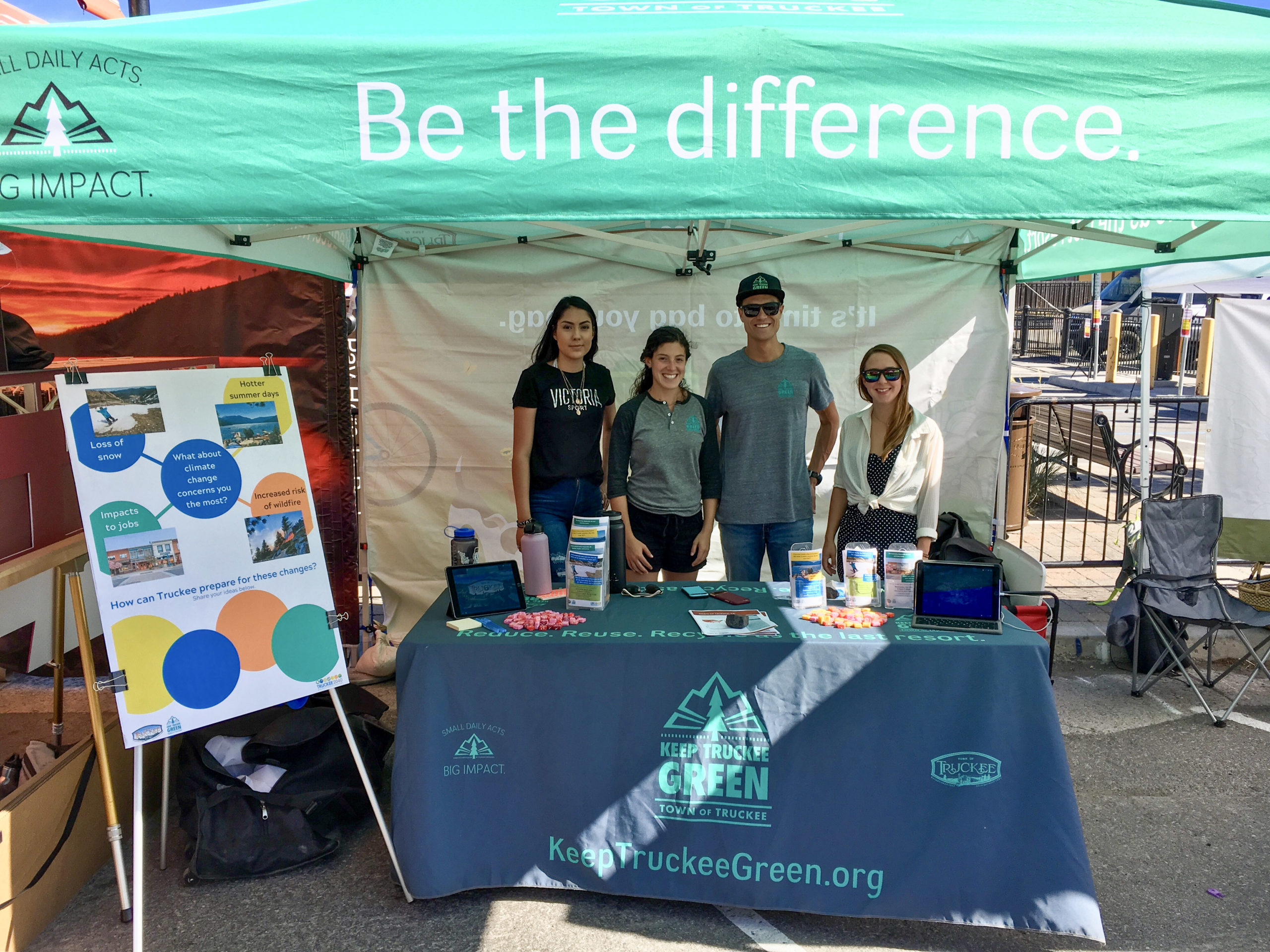60 Truckee residents crowded into the Community Rec Center, rows of chairs facing 17-year old climate activists Ben and Evan Anderson who spoke emphatically, “When we’re older, what is Tahoe going to look like? Is it going to be green and eutrophic, is the land going to be burnt and the resorts abandoned? How many species will survive? The decisions we make today will determine the lives of everyone and everything tomorrow.”
These decisions have been on the forefront of Truckee’s consciousness as wildfires tear across California and calls for action have increased with a sense of urgency. In 2017, the Truckee Town Council adopted renewable energy and greenhouse gas emissions commitments, setting the precedent for significant carbon emission reductions. To deliver on these ambitious goals, the Town of Truckee began developing both a climate action plan to address how Truckee will slow down the rate of climate change, and a climate adaptation plan to prepare the town for the unavoidable effects of climate change.
This community workshop with Ben and Evan represented one small part of the year-long, ongoing process to co-create climate solutions with the residents of Truckee.
The Town chose to contract with the Geos Institute to lead these efforts for the climate adaptation plan because of their expertise and resources in inclusionary planning and equity. To ensure integration into Truckee’s 2040 General Plan update, the Town partnered with Ascent Environmental to lead the climate action plan creation. This timeline shows the Town’s development process with both firms in 2019 and 2020.
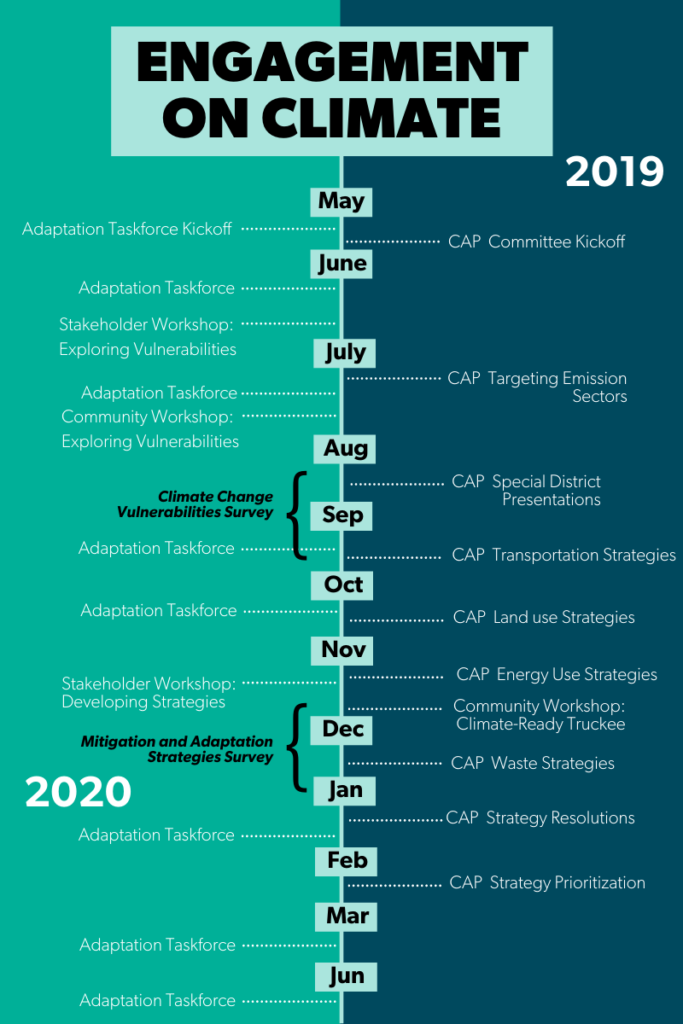
Reducing Truckee’s Greenhouse Gas Emissions
Town staff and Ascent Environmental kicked off the climate action planning process in the spring of 2019 by coalescing GPAC members to form a subcommittee, and later adding in experts from distinct sectors throughout Truckee to create a GPAC Climate Subcommittee. The group included stakeholders and experts across sectors in Truckee including local electricity and water providers, natural gas providers, environmental non-profits, a student representative, a council member, contractors’ association, the school district, local developers and other engaged residents who attended the public meetings.
This committee met nine times over ten months to develop the core strategies of the climate action plan, focusing specifically on transportation, land use, energy, and waste.
During the meetings, the advisory committee brainstormed and proposed strategies, drawing in additional details from successful policies in other cities. Together, the advisory committee worked through each one to compromise and prioritize the most effective, impactful, and implementable greenhouse gas reduction opportunities for Truckee.
Preparing for the Effects of Climate Change
The Town and The Geos Institute began the adaptation planning process using Geos’ Whole Community Adaptation framework which aims to actively engage all parts of the community, including those historically excluded from community planning.
At the center of the framework was a stakeholder taskforce of town staff, civic and industry leaders, and community members. This taskforce, composed of 12 Truckee residents, represented a diversity of experts within varying socioeconomic and natural system sectors. These community systems included energy, health, emergency services, transportation, conservation, business, civic, recreation, tourism, and human services. The group met regularly over 13 months to provide input into all levels of the plan. Taskforce members also helped lead two day-long workshops, where 35 agencies and organizations, including taskforce members, worked to identify climate vulnerabilities across Truckee and develop comprehensive adaptation strategies.
Following each stakeholder workshop was a community workshop and a community survey. In the first workshop, attendees were welcomed by the Mayor of Truckee and listened to a presentation by Geos’ climate scientist. They engaged in a collaborative art piece, watched a performance, and identified systems that will be affected by a changing climate. To gather more feedback on residents’ perception of climate vulnerabilities in Truckee, Geos and the Town then spent a month collecting surveys online and in person in both Spanish and English.
In the Town’s second workshop and survey, where Ben and Evan encouraged residents to think about Truckee’s future, mitigation and adaptation engagement efforts were considered together. Town staff collaborated with both the Geos Institute and Ascent Environmental to engage Truckee residents on strategies for both climate action and adaptation. By combining resources and integrating topics, these outreach initiatives engaged residents on the topic of climate change broadly, drawing connections between creating resilience and reducing greenhouse gas emissions. To obtain input from Spanish speakers, the Town’s adaptation plan consultant Geos helped facilitate 56 in-person surveys at the local high school and apartment communities.
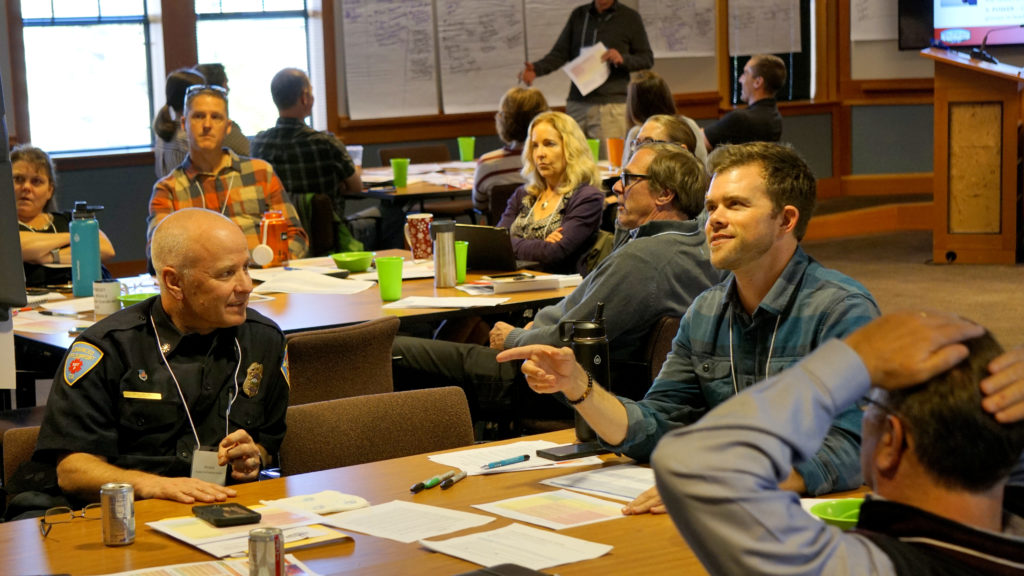
These outreach initiatives engaged residents on the topic of climate change … and drew connections between creating resilience and reducing greenhouse gas emissions.
Pursuing Deep Engagement
Throughout the engagement and co-creation process, the Town encountered barriers to involve the Latinx population within Truckee. Community members who participated in the advisory committee, workshop, and surveys were typically participants who regularly engage in the Town’s outreach efforts. Expanding beyond consistently interested participants has historically posed a challenge for the Town, particularly with under-represented and low-income groups that may not have the capacity to spend time or energy on topics related to climate change.
Though the Town took steps to create more inclusive outreach led by Latinx Outreach Liaison Andrea Fernández Landa, including advertising the workshops in Spanish, offering free childcare, providing translation services, and conducting outreach with community-based organizations and Latinx leaders, more progress can be made to expand the Town’s reach for all future community events.
How Does This Create a Climate-Ready Truckee?
Each of the advisory committee meetings, stakeholder workshops, community events, and surveys provided the basis of the policies and actions that can now be found in Truckee’s Climate Action Plan and Climate Change Adaptation Plan. Each strategy was vetted and can be traced back to specific input given by community members who participated in the process. By facilitating conversations and listening to each resident who participated, the final policies encompass Truckee’s diverse priorities and reflect a realistic, yet impactful path forward. By creating the climate action and adaptation plans with the town, not just for the town, we can all –residents, town staff, energy providers, transit operators, non-profits, community groups — implement both plans and help shape the future of Truckee.
By: Erin Ronald, Keep Truckee Green Intern
